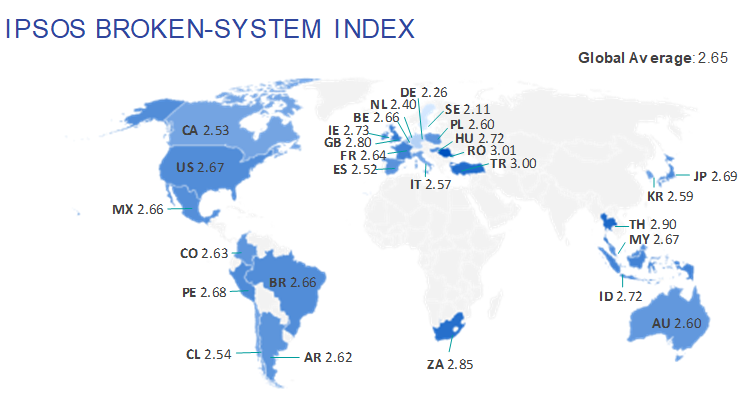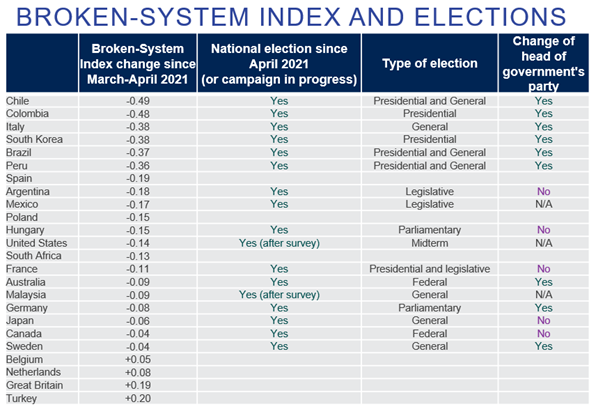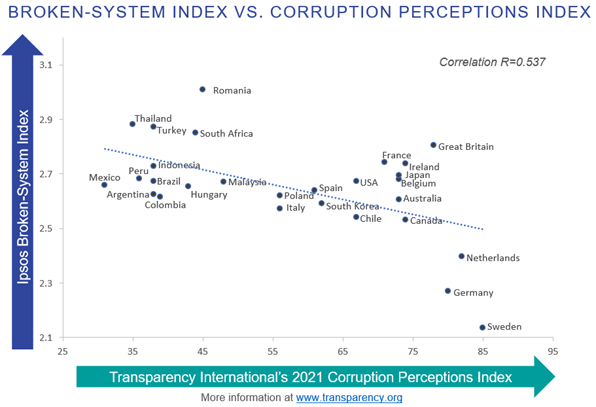‘Broken System’ sentiment declining in Australia, with this year’s change of Federal Government a likely key influence
Australians are in line with citizens of most of the countries recently surveyed by Ipsos in that they hold the view that their political and economic system is broken. On average across 28 countries, 64% feel the economy of their country is rigged to advantage the rich and powerful (63% for Australia) and 63% say that traditional parties and politicians don’t care about people like them (57% in Australia).
However, of perhaps greater interest is that the ‘broken system’ sentiment has receded since March-April 2021 when Ipsos conducted a similar survey in 24 of the 28 countries. It has declined steeply in Chile, Colombia, South Korea, Italy, Brazil, and Peru – all countries where elections resulted in a change of governing party. In Australia, where we have also had a change in government, Ipsos has seen important decreases in this broken system sentiment.
The only countries showing a significant increase in broken-system sentiment are Great Britain and Turkey.
Key Australian findings
In Australia, the key findings were as follows:
- 63% agree Australia’s economy is rigged to the advantage of the rich and powerful. This measure is unchanged in comparison to 2021.
- 57% agree that traditional parties and politicians don’t care about people like them, down 5 points from 2021.
- 61% agree Australia needs a strong leader to take the country back from the rich and powerful, also down 5 points from 2021.
- 58% agree experts in this country don’t understand the lives of ‘people like me’, down 1 point from 2021.
- 45% agree to fix Australia we need a strong leader willing to break the rules, down 8 points from 2021.
Ipsos Australia Director, Jess Elgood, said: “The current Ipsos Global Advisor Broken System findings continue to tell us that Australians feel their political system is out of touch with typical Aussies’ real lives. As is common elsewhere in the world, there is a widespread perception that the elites benefit from the political status quo, ignoring the priorities of the average voter. That said, since the 2022 change of government, the strength of feeling of the system being broken has lessened.”
Key global findings
The prevailing view among citizens of most of the countries recently surveyed by Ipsos is that their political and economic system is broken. The survey conducted from September to early November among more than 26,000 online adults finds that, among all countries surveyed, anti-establishment feelings are most widespread in Romania, Turkey, Thailand, and South Africa, and least so in Sweden and Germany.
However, broken-system sentiment has receded since March-April 2021 when Ipsos conducted a similar survey in 24 of the 28 countries. It has declined steeply in Chile, Colombia, South Korea, Italy, Brazil, and Peru – all countries where elections resulted in a change of governing party. The only countries showing a significant increase in broken-system sentiment are Great Britain and Turkey.
Anti-establishment sentiment indicators
To measure the magnitude of anti-establishment sentiment, Ipsos has developed the Broken-System Index, a peer-reviewed composite metric based on the level of agreement or disagreement with five statements.

On average across 28 countries, about six in ten adults surveyed agree that their country’s economy is rigged to favour the rich and powerful, that traditional parties and politicians don’t care about people like them, that their country needs a strong leader to take the country back from the rich and powerful, and that experts don’t understand the lives of people like them. Just under half agree that, to fix it, their country needs a strong leader willing to break rules.
Broken-System Index rankings
Among the 28 countries surveyed, those with the highest Broken-System Index scores are Romania (3.01), followed by Turkey (3.00), Thailand (2.90), South Africa (2.85), and Great Britain (2.80). Those with the lowest scores are Sweden (2.11), Germany (2.26), and the Netherlands (2.40). The index averages at 2.65 across all countries.

Do elections restore trust in the system?
Across the 24 countries already surveyed in March-April 2021, the Broken-System Index has receded by an average of 0.12 points.
Only four of the 24 countries show any uptick in their index score: one too small to be significant in the case of Belgium and the Netherlands, but a significant one in the case of Great Britain (+0.19 points) and Turkey. None of these countries underwent a general or presidential election since the last survey.
In contrast, 20 countries showed a drop – albeit a very small one in several cases. All but three of them had a major national election in the past 18 months. Furthermore, in all six countries showing a drop of more than 0.35 points – Chile, Colombia, South Korea, Italy, Brazil, and Peru – the election brought in a new head of government hailing from a different party than their incumbent.
This suggests that national elections may act as a pressure valve for anti-establishment sentiment and help restore trust in the system.

Corruption and distrust
Broken-system sentiment and perceptions of widespread corruption tend to go hand in hand.
A comparison of Transparency International’s Corruption Perception Index (CPI) with the Broken-System Index in each of the 28 countries surveyed by Ipsos finds them strongly correlated. Among them, Sweden, Germany, and the Netherlands both show the highest CPI scores (meaning they have the lowest levels of perceived corruption) and the lowest scores on Ipsos’s Broken-System Index.
In contrast, the four countries with the highest scores on Ipsos’ Broken-System Index have a relatively low CPI score.
This suggests that the sentiment that corruption is commonplace triggers feelings that the system is broken – unless distrust of the system encourages corrupt practices by making them seem justified.

About the Study
This study did not have any external sponsors or partners. It was initiated and run by Ipsos, because we are curious about the world we live in and how citizens around the globe think and feel about their world.
These are the findings of a 28-country Ipsos survey conducted September 23 – November 4, 2022, among 26,007 adults aged 18-74 in Canada, Malaysia, South Africa, Turkey, and the United States, 20-74 in Thailand, 21-74 in Indonesia, and 16-74 in 21 other countries, via Ipsos’s Global Advisor online survey platform.
Each country’s sample consists of ca. 1,000 individuals in Argentina, Australia, Brazil, Canada, Chile, Colombia, France, Germany, Great Britain, Indonesia, Italy, Japan, Malaysia, Mexico, the Netherlands, Peru, Poland, Romania, South Africa, South Korea, Spain, Sweden, Thailand and the U.S., and ca. 500 individuals in Belgium, Hungary, Ireland (Republic), and Turkey.
The samples in Argentina, Australia, Belgium, Canada, France, Germany, Great Britain, Hungary, Italy, Japan, the Netherlands, Poland, Romania, South Korea, Spain, Sweden, and the U.S. can be taken as representative of these countries’ general adult population under the age of 75.
The samples in Brazil, Chile, Colombia, Indonesia, Ireland, Malaysia, Mexico, Peru, South Africa, Thailand, and Turkey are more urban, more educated, and/or more affluent than the general population. The survey results for these markets should be viewed as reflecting the views of the more “connected” segment of their population.
The data is weighted so that each market’s sample composition best reflects the demographic profile of the adult population according to the most recent census data.
The global average reflects the average result of all the countries and markets where the survey was conducted that year. It has not been adjusted to the population size of each country or market and is not intended to suggest a total result.
Where results do not sum to 100 or the ‘difference’ appears to be +/-1 more/less than the actual, this may be due to rounding, multiple responses or the exclusion of don't knows or not stated responses.
Sample surveys and polls may be subject to sources of error, including, but not limited to coverage error, and measurement error. The precision of the online surveys conducted is measured using a Bayesian Credibility Interval. Here, the Australian results have a credibility interval of +/-3.5 percentage points. For more information on the Ipsos use of credibility intervals, please go to: https://www.ipsos.com/sites/default/files/2017-03/IpsosPA_CredibilityIntervals.pdf
As a foundation member of the Australian Polling Council Ipsos complies with the Council’s Code of Conduct. The purpose of the Code is to provide journalists and the public with greater confidence and trust in publicly released polling and survey data. We strongly encourage the inclusion of methodological details in any reference to published Ipsos results.
This study is compliant with the Australian Polling Council Code of Conduct. The Long Methodology Disclosure Statement for the study will be available at https://www.ipsos.com/en-au/disclosure_statements within two business days.


